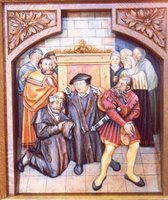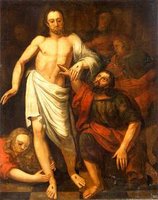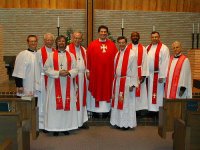Who Speaks Christ’s Forgiveness?
Q: With great interest I read your earlier response to a question on forgiveness and confession. I know God calls pastors to forgive on Christ’s behalf, but they aren’t usually present in our daily lives. What if others confess sins to believers? Friends and acquaintances have admitted their burdening sins to me; I’ve done the same with fellow Christians. Surely we forgive sins against us, as in the Lord’s Prayer. In reference to John 20:22-23, can any Christian forgive sins in Jesus’ name?
 A: For those whose memories don’t go back a year or more, I’ll quickly summarize what I said before to a person who asked about confessing sins to a person rather than directly to God. I pointed out that, for the Christian, “God provides specific individuals — our pastors — to proclaim and deliver His forgiveness. This shouldn’t surprise us, for God has a long history of working through means as He exercises divine judgment and mercy.” I showed that pastors don’t pick and choose whom to forgive but rather pronounce God’s holy Absolution to all who confess.
A: For those whose memories don’t go back a year or more, I’ll quickly summarize what I said before to a person who asked about confessing sins to a person rather than directly to God. I pointed out that, for the Christian, “God provides specific individuals — our pastors — to proclaim and deliver His forgiveness. This shouldn’t surprise us, for God has a long history of working through means as He exercises divine judgment and mercy.” I showed that pastors don’t pick and choose whom to forgive but rather pronounce God’s holy Absolution to all who confess.I also noted that individual confession of conscience-burdening sins is not a command from God but rather a gift. We must confess to God. After that, as I previously wrote, “It’s not that we ‘must’ confess to another person; rather, God allows us to do this.” Confessing privately with our pastors encourages us to examine ourselves honestly and fully. We then receive the Absolution’s rich blessing of personalized, individualized forgiveness. Additionally, this private time with our pastors also provides us comfort and guidance that we might guard against relapse and repetition of our offenses.
Now let’s look at the specifics of your question. My short answer would probably be, “Yes ... and no,” or, “It depends.” Whose sins would you be forgiving, against whom were they committed, and under what circumstances would this be done? Then, would your actions be in line with Scripture and the practice of Christianity since the Apostolic Era?
 While John 20:22-23 shows Jesus sending specific believers out to absolve (forgive sins), His immediate audience certainly wasn’t the larger group that followed Him into Jerusalem but only the few gathered in the upper room. These men He had already had called away from previous vocations, spending at least three years instructing and forming them as ministers of His Gospel. In other words, Jesus was facing the first (and only) graduating class of the original Christian seminary.
While John 20:22-23 shows Jesus sending specific believers out to absolve (forgive sins), His immediate audience certainly wasn’t the larger group that followed Him into Jerusalem but only the few gathered in the upper room. These men He had already had called away from previous vocations, spending at least three years instructing and forming them as ministers of His Gospel. In other words, Jesus was facing the first (and only) graduating class of the original Christian seminary.Similarly, He sent this specially called and prepared group out to be “witnesses in Jerusalem and in all Judea and Samaria, and to the end of the earth. (Acts 1:8)” Matthew 28:16-20 points out that these “eleven disciples” who went to the Galilean mountain with Christ were those whom He specially commissioned to “make disciples of all nations” by “baptizing” and “teaching” them. Saint Paul — himself specially called and equipped by Christ for the Apostolic ministry (cf. Acts 9:1-19; Galatians 1:11-24) — wrote of Jesus, “When he ascended on high he led a host of captives, and he gave gifts to men. (Ephesians 4:8)” So just what are these “gifts”? Paul continued, “And he gave the apostles, the prophets, the evangelists, the pastors and teachers, to equip the saints for the work of ministry, for building up the body of Christ. (vv. 11-12)”
These specially called servants, the “gifts to men” whom Christ gave, are His public messengers to the entire world. They, as shepherds of Christ’s flock, work to evangelize, forgive, and build up the current generation of believers. They are not alone in spreading the Gospel. Not only are parish pastors and Christian teachers involved in this task — godly lay people likewise help to “equip the saints” for the general ministry of lives of service in the Church and in the whole world. God in no way excludes the orderly participation of parents and other family members, of lay teachers and believing friends in the process of teaching the Faith to to the young in years and to the young in the Faith. Clergy and laity alike join in prayers and in “teaching and admonishing one another in all wisdom, singing psalms and hymns and spiritual songs, with thankfulness in [their] hearts to God. (Colossians 3:16)”
 However, the called servants of the Word have additional responsibilities in furthering the Gospel. Along with their own preaching, teaching, administering the Sacraments, and absolving the saints, they also prepare subsequent generations to follow them in the tasks and duties of the Gospel ministry. The apostles continued Christ’s model of seeking out, preparing, and placing new messengers of the Good News. As their ranks dwindled, “the evangelists, the pastors and teachers” continued training and sending out their reinforcements and replacements. That this should remain an ongoing activity in the Church is clear from Saint Paul’s letter to Pastor Titus. The apostle left him in Crete, telling him, “Put what remained [among the Cretan believers] into order” and expand the pastorate by appointing “elders in every town as I directed you. (Titus 1:5)”
However, the called servants of the Word have additional responsibilities in furthering the Gospel. Along with their own preaching, teaching, administering the Sacraments, and absolving the saints, they also prepare subsequent generations to follow them in the tasks and duties of the Gospel ministry. The apostles continued Christ’s model of seeking out, preparing, and placing new messengers of the Good News. As their ranks dwindled, “the evangelists, the pastors and teachers” continued training and sending out their reinforcements and replacements. That this should remain an ongoing activity in the Church is clear from Saint Paul’s letter to Pastor Titus. The apostle left him in Crete, telling him, “Put what remained [among the Cretan believers] into order” and expand the pastorate by appointing “elders in every town as I directed you. (Titus 1:5)”Yet while the Lord specifically calls some to preach, teach, and forgive within His Church, Saint Peter also reminds us that all Christians are “a royal priesthood” who “may proclaim the excellencies of him who called you out of darkness into his marvelous light. (1 Peter 2:9)” Christ allows and encourages believers to “proclaim the excellencies” of Christ, offering prayers on behalf of themselves and others while living lives of sacrificial love and thanksgiving.
As you indicated in your question, God wants every Christian to forgive those who sin against them. Note that in the two instances in which Christ gives His Church the Our Father, He has us say “forgive us our sins, for we ourselves forgive (Luke 11:4)” and “forgive us our debts, as we also have forgiven. (Matthew 6:12)” These phrases, understood in the context in which He gave the prayer, strongly suggest that He intended this forgiveness to involve only the offended and the offending parties. Other parts of the Sermon on the Mount similarly speak of individual believers’ behavior in matters of personal revenge (Matthew 5:38-42), loving one’s enemies (5:43-48), and judging others (7:1-6), as well as forgiving others (6:14-15).
 Christ never called all Christians to forgive all sins for all penitent believers. Instead, in His Church and under ordinary circumstances, Christ provides the regular means of proclaiming and delivering His forgiveness. That is, He calls His pastors to baptize, to preach the Good News, to feed the flock His Supper, and to publicly and privately declare and deliver His Absolution to penitent believers. These are the heirs of John 20:23, called to both “forgive the sins of anyone” who repents and to “withhold forgiveness from anyone” who refuses to repent (emphasis added).
Christ never called all Christians to forgive all sins for all penitent believers. Instead, in His Church and under ordinary circumstances, Christ provides the regular means of proclaiming and delivering His forgiveness. That is, He calls His pastors to baptize, to preach the Good News, to feed the flock His Supper, and to publicly and privately declare and deliver His Absolution to penitent believers. These are the heirs of John 20:23, called to both “forgive the sins of anyone” who repents and to “withhold forgiveness from anyone” who refuses to repent (emphasis added).In everyday life, Christian lay people to whom others pour out their sins “proclaim the excellencies” of Christ by telling these sin-stricken people of their Savior’s unsurpassed love. They point to the cross, speaking the assurance that in Jesus’ suffering and death, all sins are forgiven. Knowing the Good News, they confess and witness it to those who need to hear it, thereby leading others into Christ’s “marvelous light.” They encourage these poor souls trapped in guilt and shame to confess and believe in Christ’s forgiveness.
From its earliest days, the Church recognized Jesus’ institution of Office of the Holy Ministry. They turned to their own pastors to receive Christ’s Word, His Absolution, and His Supper. They understood that this was the normal system the Lord intended. Any rare exceptions weren’t to violate the general dictum that the affairs of the Church “should be done decently and in order. (1 Corinthians 14:40)” Even supposedly extraordinary circumstances were to be approached as closely as possible to what Christ intended for ordinary times. One early example, cited approvingly by later Christians, including Lutherans, was established by Saint Augustine.
 The Treatise on the Power and Primacy of the Pope, referring to the section of Ephesians 4 cited above, says, “Wherever the Church is, there is the authority [command] to administer the Gospel. Therefore it is necessary for the Church to retain the authority to call, elect, and ordain ministers.... Wherever there is a true church, the right to elect and ordain ministers necessarily exists. Just as in a case of necessity even a layman absolves, and becomes the minister and pastor of another; as Augustine narrates the story of two Christians in a ship, one of whom baptized the catechumen, who after Baptism then absolved the baptizer.”
The Treatise on the Power and Primacy of the Pope, referring to the section of Ephesians 4 cited above, says, “Wherever the Church is, there is the authority [command] to administer the Gospel. Therefore it is necessary for the Church to retain the authority to call, elect, and ordain ministers.... Wherever there is a true church, the right to elect and ordain ministers necessarily exists. Just as in a case of necessity even a layman absolves, and becomes the minister and pastor of another; as Augustine narrates the story of two Christians in a ship, one of whom baptized the catechumen, who after Baptism then absolved the baptizer.”See how even this special circumstance of two marooned believers follows the divine order as each in turn delivers God’s forgiveness to the other. In this emergency situation, the mature Christian first baptizes the catechumen and then, acting on behalf of all of Christ’s Church, calls the other to be minister of the Gospel in this tiny congregation of two men in a boat. I doubt that either the Lutheran confessors or Saint Augustine would have wasted paper and ink unless they wanted to indicate clearly just how much this action varied — yet also how closely it adhered — to the norms Christ established for His Church.
To sum things up, when someone sins against you and begs your forgiveness, it is your duty and privilege to grant it willingly, immediately, and completely. When one confesses other sins to you, Christ allows and compels you to tell the Good News of Christ’s atoning sacrifice. The Lord also provides you the opportunity to point this person to his or her own pastor or to extend an invitation to meet your pastor and to receive from him the fullness of Christ’s Absolution as proclaimed within His Church and your congregation.
“A Treatise on the Power and Primacy of the Pope” quoted from the public domain text of The Book of Concord.
Scripture quoted from The Holy Bible, English Standard Version™, © 2001 by Crossway Bibles.
Send email to Ask the Pastor.
Walter Snyder is the pastor of Holy Cross Lutheran Church, Emma, Missouri and coauthor of the book What Do Lutherans Believe.
Technorati Tags: confession | absolution | forgiveness | clergy | laity | pastors | Lutheran | divine call | Book of Concord | Lutheran Confessions | pastoral ministry | Christ | Jesus

1 Comments:
In his sermon on John 20:19-31, on the first Sunday after Easter, preached in 1522 at Borna, Martin Luther stated:
"Here the power of absolution is given to all Christians, although some, like the Pope, bishops, priests, and monks, have appropriated it to themselves alone. They say publicly and shamelessly that this power is given to them alone and not to the laymen as well. But Christ is speaking here neither of priests nor monks. on the contrary, he says: 'Receive ye the Holy Ghost .' This power is given to him who has the Holy Ghost, that is, to him who is a Christian. But who is a Christian? He who believes. He who believes has the Holy Ghost. Therefore every Christian has the power, which the pope, bishops, priests and monks have in this case, to forgive sins or to retain them... To be sure, all of us possess this power; but no one except him who was chosen by the congregation to do so should presume to practice it publicly. In private, I certainly may use this power. If, for instance, my neighbor comes and says: My friend, I am burdened in conscience, speak a word of absolution to me; then I am at liberty to do so. But in private, I say, this must be done."
In his sermon on the John 20 text, on the first Sunday after Easter, 1540, in Dessau , an older Martin Luther stated:
"But who can express what an unspeakable, mighty and blessed comfort it is that a human being can with one word open heaven and lock hell to a fellow mortal? For in this kingdom of Grace Christ has founded through his resurrection, we do indeed nothing else than open our mouth and say, I forgive thee thy sins, not on my account, nor by my power, but in the place of, and in the name of, Jesus Christ, for he does not say: ye shall forgive sins on your own account, but: 'I send you, as my Father hath sent me.' I myself do not do this of my own choice or counsel, but I am sent by the Father. This same commandment I give to you unto the end of the world, that both ye and all the world shall know that such forgiveness or retaining of sin is not done by human power or might, but by the command of him who is sending you. This is not said alone to the ministers or the servants of the church, but also to every Christian. Here each may serve another in the hour of death, or wherever there is need, and give him absolution."
Post a Comment
<< Home